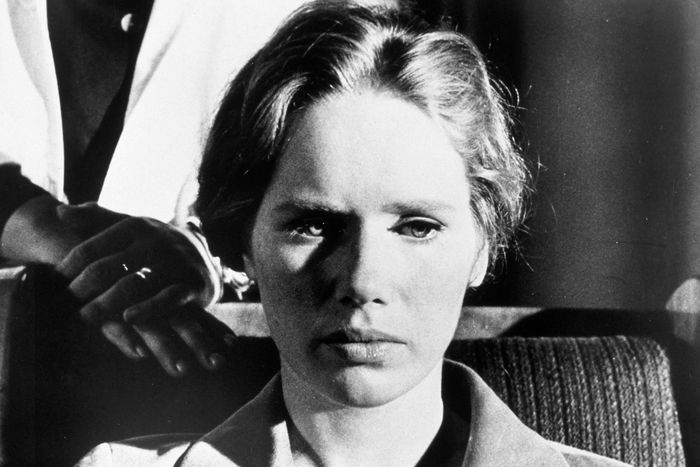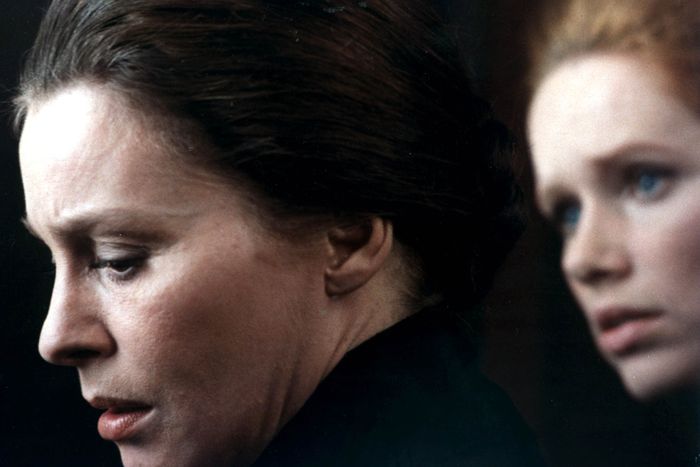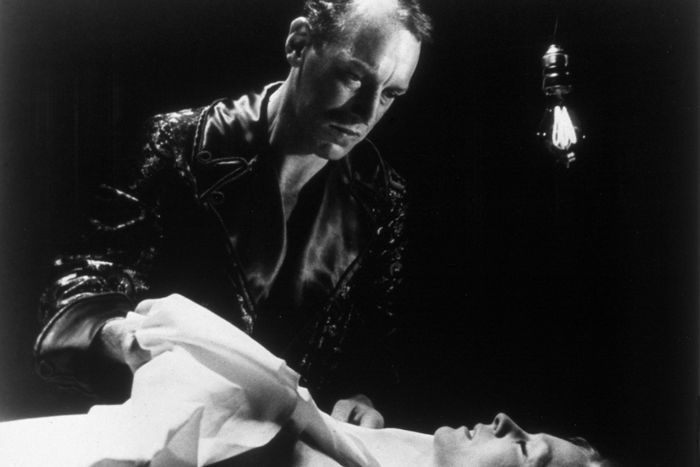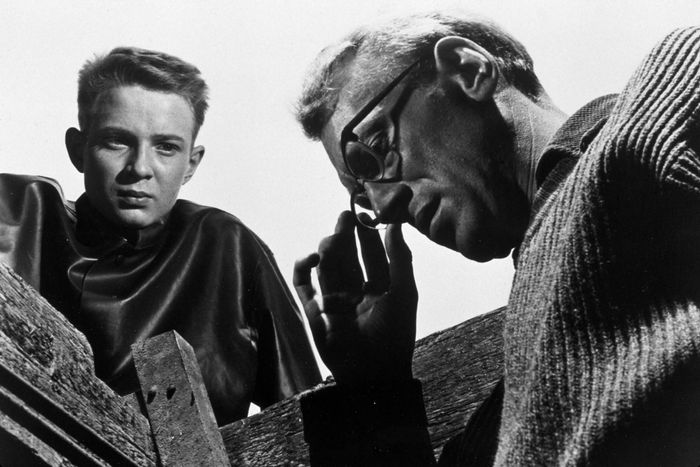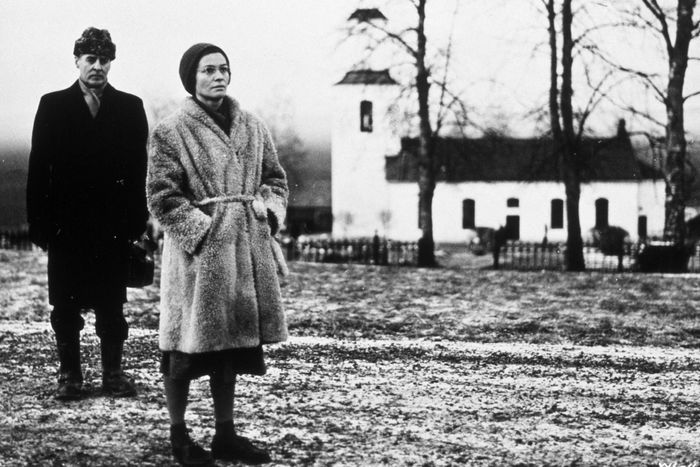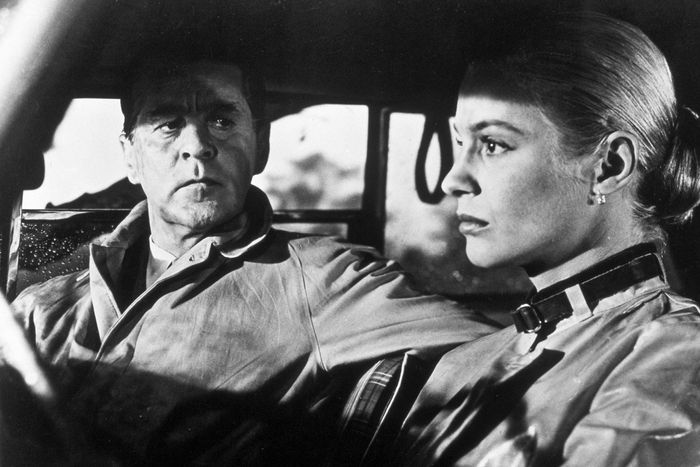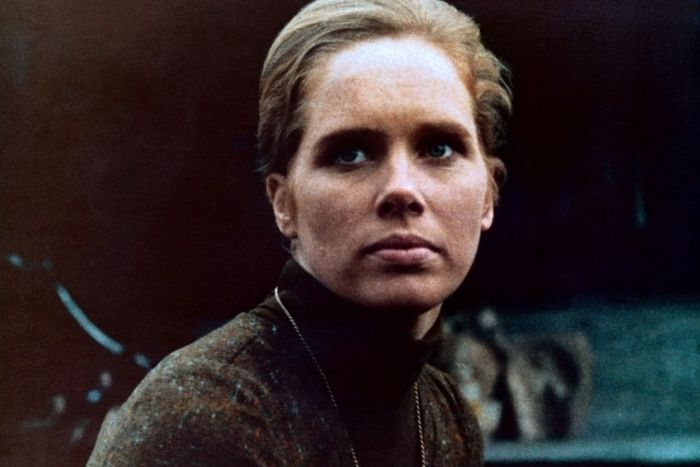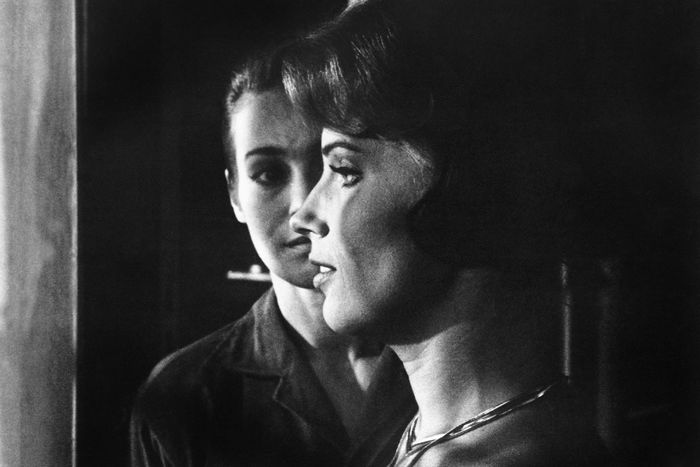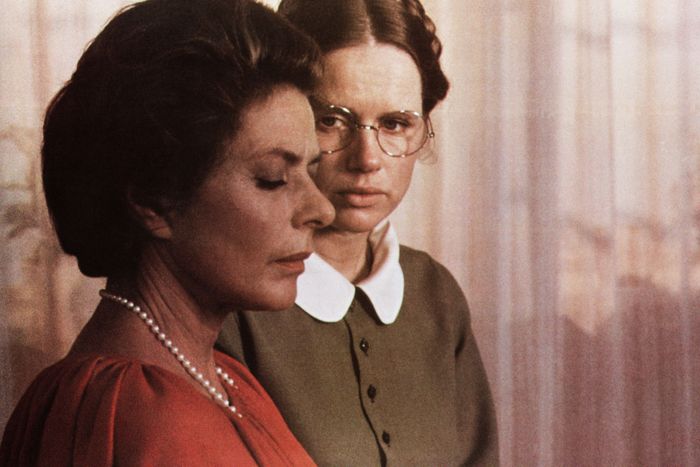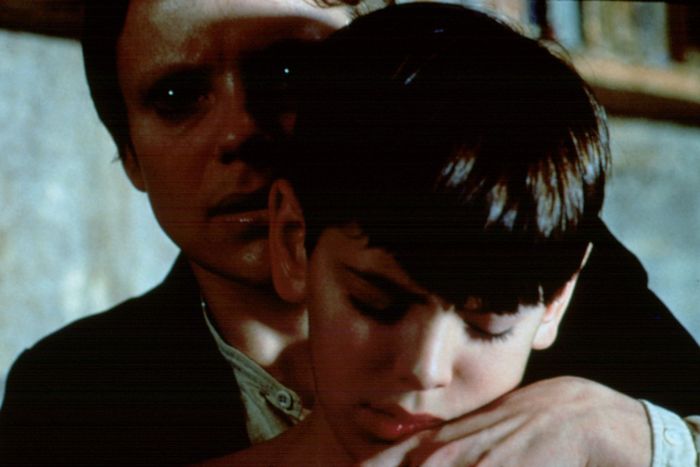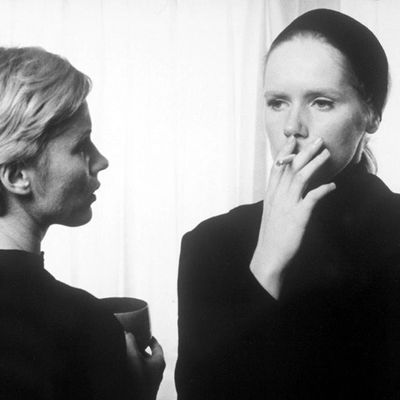
Much has been written, including by me, about how a particular movie or TV show is the “perfect quarantine viewing.” Unfortunately, everyone, including me, was wrong. After 100-plus days of serious research, I can say with certainty that the actual perfect quarantine viewing is the catalogue of Ingmar Bergman, our moody Swedish king of isolation, the most melancholic introvert ever to barricade himself and his loved ones on a small island and write movies about people slowly going insane because they have barricaded themselves on small islands.
Bergman’s films are famously bleak, the sort of existentially devastating movies that I have never been able to successfully convince anyone to watch with me unless they were already very depressed or experiencing a brief bout with self-destruction. I understand why: In the Before Times, after I’d watch Bergman, I’d float around my house, picking things up and wondering why I had ever bought them in the first place, considering I was just going to die alone in a spotless white nightgown while my siblings gossipped about me in the living room.
But these days, with many of us back in some form of self-isolation after having merely glimpsed what a reopening of society might look like, I experience a new feeling watching the same films: relief. The point of Bergman’s movies — almost all of which center on people drowning in gloom, occasionally coming up for air, only to be shoved back down into the inky darkness — is that the world is bad and life is inherently gnarly. The status quo is that shit is fucked. According to Bergman’s ethos, you’re genuinely lucky to find one or two moments of happiness per lifetime. But if you don’t, and your life is overflowing with pain and confusing interactions with estranged family members forced to live with you in a small space, you don’t really get to complain too much about it, because, again, nobody promised you it would go otherwise — least of all Ingmar Bergman.
Viewed during one of the worst moments in our recent collective global history, Bergman’s movies no longer offer a sort of sadomasochistic escape from dull banality, or an opportunity to feel like a bravely ascetic Swede. In many ways, they now reflect everyday life. Almost every single one of Bergman’s movies features the following: two to four people trapped together in a living situation that is less than ideal; a person who is mysteriously ill and convalescing for a lengthy period of time; a conversation about the absence or death of God; a woman named Karin (this isn’t relevant to quarantine, I just want to point out that there are a bizarre number of women named Karin in his movies); someone descending uncontrollably down the ladder rungs of their own crumbling psyche; vague or explicit notions of incest; musings on the futility of art; physical manifestations of loneliness; endless meditations on death; and people staying up all night saying absolutely wild shit to each other.
Bergman’s movies are also designed for our current attention spans, which, if my own is any indication, now have two modes: “military-grade focus” or “toddler roaming the Museum of Ice Cream.” Each film runs either a tight 90 minutes or a languid five hours long, with very little variation. All of them move very slowly from a plot perspective, though, which means if you stop paying attention for a few minutes because Trump has just instructed people to drink their own blood as a preventative measure, you’re good. Bergman plucks from a small pool of recurring actors, so watching his movies feels a little like greeting old friends. And as an almost unnecessary bonus, Swedish is a very calming language with a sort of ASMR effect.
Accordingly, over the past few months, I have accurately predicted my own ability to pay attention to something, chosen a Bergman film with a corresponding length and that corresponds to my specific quarantine mood, and ended my evenings totally sated and soothed, drifting off to sleep like people in his movies literally never do. Join me (and Edgar Wright, apparently) on this extremely questionable journey, and let’s unpack the #quarantine #vibes of ten of Bergman’s best movies (all available on Criterion) about isolation, madness, and growing to hate the people you live with.
1. Persona
When to Watch: When you begin entertaining thoughts that you and your roommate may actually just be one person.
Perhaps the ne plus ultra of Bergman films about people trapped together who start slowly freaking out and eventually consider murdering each other, Persona follows Elisabet (Liv Ullmann), an actress who has mystifyingly gone mute, and Alma (Bibi Andersson), the nurse tasked with taking her to a small island to recover. At first, the women seem to bond: Elisabet listens (her only option, really) as Alma purges a lifetime of increasingly intense secrets during a drunken evening; Alma patiently attempts to convince Elisabet to start talking again. But soon, Alma starts to both fall in love with and resent Elisabet, and Bergman begins to blur the lines between the two women — and between reality and liminality. Bergman wrote Persona during a bout with pneumonia, and it captures the surreal musings of a brain racked with fever, cabin or otherwise. At the end of the film, you’re left with a paralyzing sense of doubt about everything that just unfolded, which is how you feel all the time now anyway. Allow yourself to feel relaxed by that symmetry!
2. Cries and Whispers
When to Watch: When your interfamilial tension begins manifesting itself as low-key psychosexual drama.
Three sisters and their maid are trapped in the countryside, milling about in red rooms dressed in stark white. Agnes (Harriet Andersson) is dying of an unnamed cancer; her sisters Karin (Ingrid Thulin) and Maria (Liv Ullmann) are emotionally stunted and selfish, and can’t handle the intensity and intimacy of her imminent death. Rather than care for her, they just hang out separately in the living room, doing the sorts of things we’ve all been doing over the past few months: writing in journals, getting hand cramps, fantasizing about stabbing themselves and/or their incredibly dull husbands, and occasionally slapping one another in the face. The maid, Anna (Kari Sylwan), is deeply connected to Agnes, and sits in bed with her as she wails in pain, cradling her against a naked breast. As he often does, Bergman plays with the foggy nature of human relationships, intensifying complicated dynamics by forcing his characters to spend an unhealthy amount of time together: Were Agnes and Anna once sexually involved, or is their dynamic more parent-child? Why do Maria and Karin despise each other so deeply? Who ate the last instant ramen, and are they going to go to the store to get more or just pretend they didn’t notice?
3. Hour of the Wolf
When to Watch: When your partner starts openly talking to themselves.
Alma (Liv Ullmann, playing a different Alma than the previous Alma, but again, I am starting to think there are only four names for Swedish women) and her husband Johan (Max von Sydow) are living on an island, theoretically alone, so that Johan, a celebrated artist, can bop around and paint on the beach. Though they begin their little vacation by cuddling in the sunlight, with Johan doting on a pregnant Alma, things go downhill quickly. Johan begins hallucinating (OR DOES HE?) freaky island dwellers, including a woman whose face comes off with her hat and a young demonic child. Soon, Johan can no longer sleep at all, staring at his watch in the middle of the night and raving to his wife about “bird men” and, of course, mentions he is still recovering from an unexplained illness. When Alma and Johan attend a dinner party thrown by the island’s handful of other inhabitants, all of whom are far too excited to hang out, Alma realizes that she’s in danger, girl, and things devolve much further from there. Hour of the Wolf is about how total isolation can and will destroy you, even if you choose it willingly. But other people will destroy you, too. And even when we’re together, we’re still ultimately alone — no matter how much we love each other, we cannot save each other from our demons, literal or figurative. Are you soothed yet, or …?
4. Through a Glass Darkly
When to Watch: When you’re considering going home to live with your parents in the suburbs for a while, latent psychological trauma be damned.
The first in an informal trilogy about faith and religion and the palpable silence of God (followed by Winter Light and The Silence), Through a Glass Darkly follows yet another family on a remote island retreat. Karin (!!), played by Harriet Andersson, is struggling with the onset of what’s described as an incurable schizophrenia; her husband (Max von Sydow), her younger brother Minus (Lars Passgård), and her father (Gunnar Björnstrand) all handle the inevitability of her mental decline in different and equally unproductive ways. When Karin finds out that her father has been using her mental illness as fodder for his novels, she experiences a full break with reality, talking to people she believes live behind the house’s walls and doing some very questionable things with her brother in the hull of a ship. Though Karin’s plight is hyperspecific, Through a Glass Darkly deals more broadly with questions about a perceived emptiness at the center of the human experience, and about the way it can feel like life itself is a kind of trap (“I wonder if everyone is caged in,” muses Minus. “You in your cage, me in mine, each in his own little cube.”) It’s also about how it is not a good idea to live with your parents after you have reached adulthood — something that’s become harder for a lot of people to avoid in our current crisis. I suppose the real lesson, then, is if you are in fact stuck in a small house with your relatives, do not read your dad’s diary and let your brother do his homework by himself.
5. Winter Light
When to Watch: When you begin to wonder if you should tune into Hillsong’s virtual services.
Winter Light served as one of the primary inspirations for Paul Schrader’s First Reformed, with both films following the tortured journey of a small-town pastor beginning to doubt his own faith. Gunnar Björnstrand plays Tomas, the pastor in question, who, when approached by a parishioner named Jonas (Max von Sydow) and his wife Karin (!!!!!), played by Gunnel Lindblom, about obsessive fears of nuclear war, can’t do anything but admit that he has no idea what the actual fuck is even going on with anything. “Why must life go on?” asks the spiritually devastated Jonas. Tomas has no reply, and this sends him into a fit of conflicted self-loathing. He lashes out at the only woman who really loves him (Ingrid Thulin), disappoints his congregation, and, naturally, is plagued by mysterious coughing fits. Anyway, now I will get to the part that made me feel a little bit better with regards to our current plight. Maybe you won’t feel the same way, and that’s okay — there are other pastors with lighter vibes! “If there is no God, would it really make any difference?” wonders Tomas at one point. “Life would become understandable. And this death would be a snuffing out of life. The dissolution of body and soul. Cruelty, loneliness, and fear — all these things would be straightforward and transparent. Suffering is incomprehensible, so it needs no explanation.”
6. Wild Strawberries
When to Watch: When you start hallucinating visions of your hot cousins.
Wild Strawberries is one of the more cheerful entries on this list, which is saying a lot, considering it is about the bittersweet regrets and memories of an old man who has alienated almost everyone in his life. We follow persnickety professor Isak Borg (Victor Sjöström), who describes himself as an “old pedant” who has “withdrawn from social relations” (same), as he travels across the countryside to receive an honorary degree, picking up various strangers along the way. At certain points on his journey, Isak drifts into the recesses of his own mind, experiencing flashbacks and surreal dreams: he speaks to a cousin he once loved, approaches a freaky man with a smushed-up face, visits his dead wife Karin (…), and, when awake, bickers with his housekeeper. We understand that Isak is coming to terms with the imminent end of his life, and Bergman lays the symbolism on a bit thick: a clock with no hands, a coffin falling off a hearse and opening to reveal the dead body of Isak himself. But Wild Strawberries is a powerful meditation on aging and death and wisdom and human relationships, and a reminder that it’s more important than ever to hold tight to the bonds between us and our loved ones, and to really think about why there are so many Karins. I mean, what is he trying to tell us here?
7. The Passion of Anna
When to Watch: When you consider texting an ex out of skull-shattering boredom.
Max von Sydow’s Andreas, a horny and isolated divorcee with a tiny dog, lives alone by the sea in a town where someone is mysteriously slaughtering animals. When we meet him, Andreas is all of us in quarantine: He stumbles around the snowy forest, screaming his own name, drunk; he walks around his own house, bored to shit, drinking whiskey and staring at his walls and yelling at nobody. To assuage his loneliness, he strikes up an affair with a neighbor, even going so far as to inexplicably give her his dog, his only companion, then regret it instantly. Later, he begins a more structured relationship with Anna (Liv Ullmann), a widow with a limp (another recurring Bergman theme, the man loves a limp) who may or may not be a murderer. In other words, Andreas is making the sorts of poor choices that we’re all making right now, just to feel something. Throughout the film, Bergman pauses the narrative to have the actors comment on their characters, which is truly jarring and I’m not sure it totally works — but in the context of our current reality, where it feels like we’re all tearing off our figurative masks, it makes a sort of twisted sense.
8. The Silence
When to watch: When you’re like, “What if we just go somewhere random and get a hotel room and stay there for a little bit?”
The final entry in the trilogy mentioned above, The Silence is even more aggressively fixated on death and disease and involuntary seclusion. Ester (Ingrid Thulin) and Anna (Gunnel Lindblom) are sisters traveling by train with Anna’s young son, Johan (Jörgen Lindström) — there are also a hell of a lot of Johans in these movies, but let’s not get into that, we simply don’t have the time — to an unnamed, war-torn country. As is often the case in Bergman’s films, Anna and Ester can barely stand each other: Ester, a serious intellectual, is sick and dying and just wants her sister to sit and hold her hand; Anna, openly sensual and vibrant, is fixated on sucking the marrow out of life, going so far as to leave their hotel room to have sex with a stranger nearby. Both use poor Johan as something of a pawn, which leads Johan to act out in weird ways, like pulling a fake gun on unassuming hotel guests. As Ester alternatively coughs blood into her handkerchief, translates foreign languages, and smokes compulsively, Anna coldly rebuffs her and instead just sort of takes baths and does her eyeliner (impeccably, I must say). The Silence again grapples with the notion that God has abandoned us, and that, in the face of the void, we all make exceedingly self-destructive choices.
9. Autumn Sonata
When to Watch: When you consider creating a “pod” with estranged family members.
Many of us are quarantined with less than ideal roommates, but perhaps nobody has it as bad as Eva (Liv Ullmann), whose once-absent mother Charlotte (Ingrid Bergman) shows up on her doorstep and proceeds to low-key psychologically torture her for 24 hours straight. An icy cold concert pianist who consistently ignored her kids as they were growing up, Charlotte has no plans to face the torment she put both of her daughters through, one of whom is now dying of — yes — a mysterious illness that the doctors have attributed to her being essentially motherless. But over one long, painful, drunken evening, Charlotte and Eva confront each other about their perceived mutual failings, specifically about the notion that “the mother’s injuries are handed down to the daughter, and the mother’s failures are paid for by the daughter, and the mother’s unhappiness will be the daughter’s unhappiness.” At one point, a devastated Eva wonders aloud whether her own tragic life (she lost her own child very young, and now spends her days taking care of her dying sister) is somehow pleasing to her mother, wailing, “Is the daughter’s misfortune the mother’s triumph?” I guess my primary point is that your quarantine pod could be a lot worse.
10. Fanny and Alexander
When to Watch: When you’re feeling deeply nihilistic and need a reminder that life won’t always suck this badly.
I don’t want to leave you feeling too despondent, and neither did Ingmar. One of his last films, and perhaps his most autobiographical, Fanny and Alexander is a surprisingly hopeful, beautiful film about coming of age, loss of innocence, and ultimately, the triumph of the human spirit (I know, but just trust me). There are two versions available: the five-hour TV series and the three-hour theatrical cut, but I’d recommend diving into the five-hour version over subsequent nights. It’s worth it. F&A follows its titular Alexander, part of the warm and buoyant Ekdahl family, as he witnesses the tragic death of his father, his mother’s remarriage to an evil bishop, his own loss of faith in childish magic, and his eventual rediscovery of a larger, more mystical and more benevolent force at work in the universe. It’s one of my favorite movies, in large part because it so perfectly captures the dynamics of a real and deeply loving family, in all of its chaos, dysfunction, joy, bitterness, sadness, and unconditional support. It’s also a genuinely soothing balm for almost anything that ails you, whether it’s loneliness or fear or grief — a reminder that the world has secrets we’ll never really understand, that melancholy is as natural a state as delight, and that the veil between life and death, between reality and dreams, might be much thinner than we think it is.



